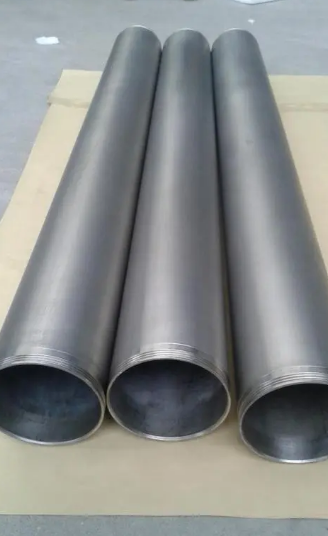First, the density is tiny, the specific strength is high.
The density of titanium is 4.51g/cm3, which is higher than aluminum but lower than steel, copper and nickel, but the specific strength is the first among metals. Baoji titanium treatment
Two, corrosion resistance
Titanium is a highly active metal with extremely low equilibrium potential and elevated thermodynamic corrosion tendency in medium. But in fact, titanium is extremely stable in numerous media, such as titanium in oxidizing, neutral and weak reducing media is corrosion resistant. This is because titanium and oxygen have a particularly large affinity. In the air or oxygen-containing medium, titanium surface generates a layer of dense, strong adhesion and inert oxide film, which protects the titanium matrix from corrosion. It quickly heals itself or regenerates even from mechanical wear. This indicates that titanium is a metal with a strong passivation tendency. The dielectric temperature below 315℃ titanium oxide film invariably maintains this characteristic.
In order to improve the corrosion resistance of Titanium and Titanium Tubing, surface treatment technologies such as oxidation, electroplating, plasma spraying, ion nitriding, ion implantation and laser processing have been developed, which have enhanced the protective effect on the titanium oxide film and obtained the desired corrosion resistance effect. In order to meet the demand of metal materials in the production of sulfuric acid, hydrochloric acid, methylamine solution, elevated temperature wet chlorine gas and elevated temperature chloride, a series of corrosion resistant titanium alloys such as Ti-Mo, Ti-Palladium, Ti-Mo and Ti-Ni have been developed. Ti-32 molybdenum alloy is used in titanium castings, Ti-0.3 molybdenum-0.8 nickel alloy is used in the environment where seam corrosion or pitting occurs frequently, and Ti-0.2 palladium alloy is used locally in titanium equipment, all of which have obtained excellent results.

Three, excellent heat resistance
The original titanium alloy can be used at 600℃ or higher for a long time.
Four, good low temperature resistance
The strength of titanium alloys TA7 (Ti-5Al-2.5Sn),TC4(Ti-6Al-4V) and Ti-2.5Zr-1.5Mo increases with the decrease of temperature, but the plasticity changes little. It maintains excellent ductility and toughness at -196-253℃ and avoids cold brittleness of metal. It is an ideal material for cryogenic containers, storage tanks and additional equipment.
Five, strong damping resistance
Titanium is subjected to mechanical vibration, electrical vibration, compared with steel, copper, its own vibration attenuation time is the longest. This property of titanium can be used as a tuning fork, vibration element of ultrasonic mill in medicine and vibration film of high quality sound speaker.
Six, non-magnetic, non-toxic
Titanium is a non-magnetic metal, in a extremely large magnetic field will not be magnetized, non-toxic and has a excellent compatibility with human tissue and blood, so it is used by the medical community.
7. The tensile strength is close to the yield strength
This property of titanium indicates its strong bending ratio (tensile strength/yield strength), which indicates the plastic deformation difference of titanium metal during forming. Due to the large ratio between the yield limit and elastic modulus of titanium, the springback ability of titanium forming is large.
Eight, excellent heat transfer performance
Although the thermal conductivity of titanium metal is lower than that of carbon steel and copper, due to the excellent corrosion resistance of titanium, the wall thickness can be considerably reduced, and the heat transfer mode between the surface and steam is droplet condensation, reducing the heat group, likewise surface without scaling can also reduce the thermal resistance, so that the heat transfer performance of titanium is significantly improved. Baoji titanium processing
Nine, low modulus of elasticity
The elastic modulus of titanium is 106.4GMPa at room temperature, which is 57% of that of steel.
Ten, suction performance
Titanium is a chemically active metal that reacts with numerous elements and compounds at elevated temperatures. Titanium suction mainly refers to the reaction of carbon, hydrogen, nitrogen and oxygen at elevated temperature.
Three functions of titanium
Functional materials are engineering materials with physical properties, that is, materials with extraordinary properties in electricity, magnetism, sound, light, heat and other aspects, or show extraordinary functions under their action. Studies of titanium and titanium alloys have revealed three remarkable functions and promising applications:
Ti-ni alloy is recognized as the best memory alloy with unidirectional, bidirectional and omnidirectional memory effects at a certain ambient temperature. In the engineering to do pipe joint for fighter jet oil pressure system; the pipeline system of the petroleum complex; a 500mm diameter parabolic mesh antenna made of 0.5mm diameter wire is used for aerospace aircraft; in medical engineering for the treatment of snoring; made of screws for fracture healing and so on. The above applications have obtained obvious results.
Two, the superconducting function from Niobium-titanium alloy at temperature below the critical temperature, showing zero resistance superconducting function. Baoji titanium production
Three, hydrogen storage function Titanium-iron alloy has the characteristics of hydrogen absorption, the safety of a large amount of hydrogen storage, and in a certain environment to release the hydrogen. It has promising applications in hydrogen separation, hydrogen purification, hydrogen storage and transportation, and the manufacture of heat pumps and batteries using hydrogen as energy.